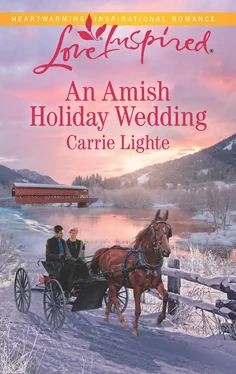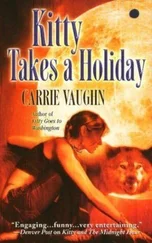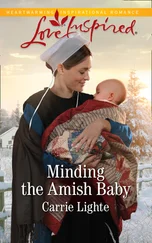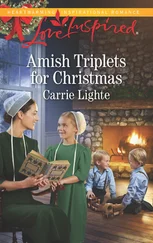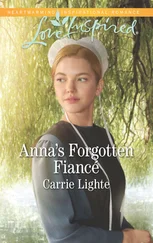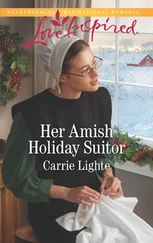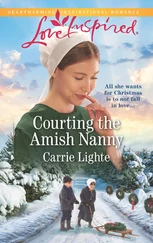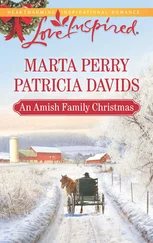While Faith knew Henrietta had her best interests at heart, her words stung. The “significant reason” a man wouldn’t wish to marry her was Faith’s most intimate secret, something only family members knew. Well, only family members and Lawrence Miller. Faith felt compelled to confide in her former suitor after he asked her to marry him two years ago.
She vigorously kneaded a lump of dough as she recalled the afternoon she disclosed her secret to him. She’d been so nervous she hadn’t eaten for two days, and when she finally worked up the courage to tell him, she was uncharacteristically tearful.
“There’s a possibility I might not be able to bear kinner ,” she confessed, chewing her lip to keep herself from weeping.
The color drained from Lawrence’s long, thin face as he slowly shook his head. That’s what Faith remembered most clearly—his shaking his head without saying a word.
She was too modest to explain that the year she turned seventeen, she had surgery to remove dozens of cysts from her ovaries. The cysts were benign, but the doctor warned the surgery caused scarring that could result in infertility. At the time, her relief over not having the kind of cancer that claimed her mother’s life outweighed any concern Faith had about not bearing children. She hadn’t fully appreciated the repercussions of the surgery until she and Lawrence began walking out and planning a future together.
“I know how upsetting this must be to hear,” she consoled him. “But if it turns out I can’t become, well, you know... We might consider adopting—”
She may as well have suggested flying an Englisch rocket to the moon to retrieve a child there for how preposterous Lawrence claimed her idea was. Adoption took too much time, he said, and it was too costly to adopt one child, much less the six or eight he was hoping to have.
“The doctor said there’s a possibility I won’t be able to have kinner ,” Faith emphasized in between the sobs she no longer tried to stifle. “It’s only a possibility .”
“I’m sorry, Faith, but that’s not good enough for me,” he said.
She knew he meant she wasn’t good enough for him. She was damaged. Scarred. Less than a woman. She understood then that she’d probably never marry—at least, not until she was much older, or unless a widower with children of his own sought to court her. And since she wouldn’t marry, there was no sense courting, either. But Faith didn’t mind because it meant she’d never have to tell any man her secret ever again. The rejection and the shame of disclosing her condition were more than she could bear a second time.
She clapped the flour from her hands as if to banish the memory of Lawrence from her mind. Regardless of what Henrietta or anyone else said, she didn’t need a mate to take care of her. With God’s grace, she’d take care of herself just fine. As for living alone, she was looking forward to it.
For the moment, she had six dozen lemon cupcakes with lemon buttercream frosting to prepare for the Englischer who’d pick them up at eleven o’clock. She started mixing the ingredients, using every egg that wasn’t required for the egg wash for the bread. She’d have to forgo making doughnuts until later, but her customers would just have to settle for something else.
We don’t always get what we want , she thought as she mixed the batter into a smooth, creamy texture. But we can make the most of the options we have.
Which was exactly what she intended to do herself. No matter what anyone thought about her decision to live alone, Faith was determined not to lose the bakery. A few cracked eggs or critical remarks weren’t going to keep her from accomplishing her goal. Nor was a future without a husband going to keep her from being happy.
* * *
During breakfast, Hunter’s aunt asked if he’d assist her with a significant undertaking.
“Of course I’ll help you, Ant Ruth. That’s why I’m here. I’m happy to make house repairs and tend to the yard and stable. Do you need me to take you to your doctor’s appointments, as well?”
“ Jah , I have appointments coming up soon. But what I really need you to do is oversee my shop. It’s been closed for the past week, and Thanksgiving and Grischtdaag are just around the bend. They’re my busiest seasons.”
Hunter took a large bite of biscuit so his mouth was too full to respond. His uncle owned a furniture restoration business, with his main workshop at home and a smaller storefront in town. After he died, Ruth converted the space in town into a cannery, where she sold jams, relishes, fruits and chow chow. Hunter knew nothing about canning, and he didn’t particularly care to learn.
As if reading his mind, Ruth explained, “You wouldn’t be expected to do the canning. I’ve put up plenty of jars for now, and harvest season is over. If the shelves run low, your mamm has agreed to help with the canning, although she’ll have to use store-bought produce for the ingredients, which is what I sometimes do in the winter.”
“You want me to serve customers?” Hunter questioned. “I wouldn’t be able to distinguish pickled beets from raspberry preserves!”
“ Neh. My employee, Ivy Sutter, waits on customers. She knows everything there is to know about the products. But she has a special way of learning, so when she’s ringing up purchases, she needs supervision—and protection. She’s such an innocent maedel . Our regular customers are fine people, Englisch and Amish alike, but I’m concerned some of the tourists might take advantage or make demands.”
Hunter set down his fork. He was familiar with his aunt’s compassion for anyone who struggled with a difference of ability or who didn’t fit in as well as others did. But Ruth was gifted; she had a way with people. He didn’t. At least, he didn’t anymore. Most days, his pain was so intense it took all of his resolve not to snarl at his own mother. How would he tolerate demanding customers or keep his patience with a girl who had learning difficulties?
“You wouldn’t just be supervising Ivy. You’d also restock the shelves and keep the books. Of course, I’d pay you fairly,” Ruth concluded.
“He wouldn’t think of accepting payment, would you, Hunter?” his mother, Iris, interjected.
Hunter’s ears felt inflamed. He knew it was a sin to be prideful, but his aunt’s offer of a salary wounded his ego—primarily because he was in such desperate need of an income. It had been so long since he’d had full-time employment, he forgot what it felt like to receive an honest day’s wage. Since his accident, he’d taken as many odd jobs as he could get, but they were few and far in between. The leit in his district helped with a significant portion of his hospital bills, but his rehabilitation was ongoing. In fact, he’d prematurely quit physical therapy because he knew they could no longer afford the sessions and pay for his mother’s medical costs. He didn’t want to keep imposing on the church, especially since others’ needs seemed greater than his own.
Most humiliating of all, right before they left for Willow Creek, he’d received a notice from the bank stating they were on the brink of losing the house if they were delinquent with another mortgage payment. To the Amish, making a payment late was considered almost akin to stealing, since it denied the payee their fair due on time. While the payments were very small, Hunter still had difficulty scraping together enough to cover the mortgage. He shielded his mother from their financial woes, but he was so overwhelmed he was tempted to accept a lawyer’s offer to sue the trucking company that employed the driver who hit them. Thankfully, the temptation left him almost as soon as it struck: it was unthinkable for the Amish to engage in a lawsuit for financial gain.
Читать дальше
